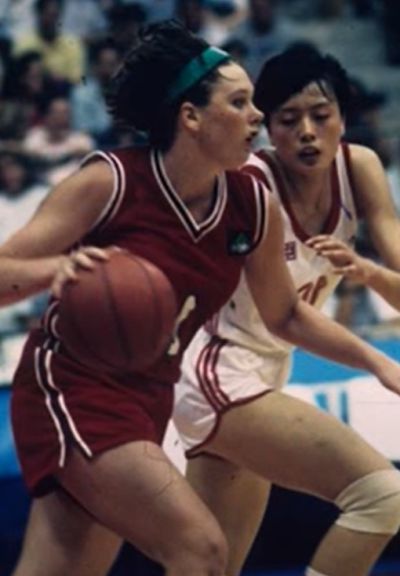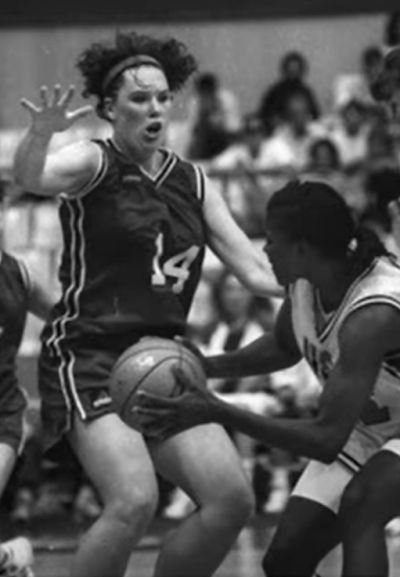By
Natalia Zassoulskaya (Kaunas, 1969)is considered one of the five best players in the history of Soviet basketball and spent much of his career in Spain between Dorna Godella (1991-96) and Pool Getafe (1996-98). And not only does he have great memories of our country for the two Euroleagues that he won in Valencia with Dorna (1992 and 1993), In 1992 he won Olympic gold in Barcelona 92 with the Unified Team. He won gold in three European Championships (1987, 1989 and 1991), silver in the 1998 World Cup (with Russia) and Olympic bronze in Seoul 88. Now, he enters the Spanish basketball Hall of Fame in the important year, in addition, of the centenary. of the Federation.
You have been in the FIBA Hall of Fame since 2010. How does it feel when after a long retirement they remember you to enter the FEB Hall of Fame?
I really didn’t expect it at all. I don’t like these celebrations but it was a very pleasant surprise.
When conducting this interview he told me that if we had to talk about his entire career, it would be long…
Yes, I have many memories from my career although they are repeated. But of course, my life is already long, I am already 54 years old, I have enough to tell.
Lets start by the beginning. How does a girl from the former USSR start playing basketball?
My coach came to my school looking for tall, athletic girls… And she chose me. She called my mother and she convinced me. I liked dancing and other things. More than she convinced me, she forced me, she put a strong hand and forced me to play basketball. At first I didn’t like it at all. I was nine years old, I wasn’t very tall but I was very skinny and very fast, I beat the boys in all the games we played. And at that moment I started taking basketball classes.
It was said that in the USSR athletes were not professionals…
Yes, we were professionals. I signed my first contract when I was 15 years old and I was already earning money at Spartak Leningrad.
He arrived in Spain very young, 22 years old, just when the USSR began to dismember into different republics. I guess that had a lot to do with it.
Yes, quite a bit. My coach, Gomelsky, sold me. My story was linked to Spain. I made my debut with the USSR team in ’87, in Cádiz; Then I played the Junior World Championship in Bilbao, in ’89. I played my first Final Four of the European Cup in Barcelona, in ’91. And in ’92, the Games, in Barcelona, where we won gold. I had three offers to decide on: France, Italy and Spain. I loved Spain and I think it was better for me. Furthermore, Gomelsky knew that at Godella he would have Miki Vukovic as coach and, although they didn’t get along, it was good for me. They were from the same school… Plus, they paid me more here (laugh)… And I imagine him too, because although he was not my agent, he was the one who negotiated.
And as soon as they arrived, seven consecutive Leagues and two European Cups with Godella, a team from a country in which women’s basketball had never won anything…
Yes, when we played against Spain we always beat them by fifty. At that time women’s basketball was not at the current level.
Did you find your second home in Valencia?
Yes, I loved Spain. For me it was the closest country, because of the people. They look a lot like Russians although at first we seem dry and cold. Now I live here. I came before the pandemic and I already stayed, also because of the war.
How much did Miki Vukovic have to do with its adaptation?
Miki wasn’t just my coach. He gave me a lot of very important life advice. He had principles that few have. He gave me advice on how to show my face. And he was also very manly. He never let you pay, he was the most generous person I have ever seen in my life.
I signed my first contract when I was 15 years old and I was already earning money at Spartak Leningrad
What do you remember about that first European Cup in Bari?
I remember that I didn’t play very well. I always had a slump in March or April, I don’t know why. I felt like I had no strength. And it wasn’t because I was scared of the finals. On the contrary, I loved playing them, they had a lot of character. As April passed, I was beginning to pick up the pace again.
Look at the impact that women’s basketball had during those times when TVE did not broadcast the game live but rather a delayed summary…
I don’t remember. I didn’t realize those things then, I didn’t care. I wasn’t interested in my statistics either. Now everyone is there with the points they have scored, the rebounds… It didn’t matter to me.
For an athlete who developed her career primarily in the nineties, what do you think when you see the demands of female athletes? For example with the women’s soccer team.
I am very happy about this. Women are equal to men. I am not a feminist. There are some things that I don’t like but women have the right to have our power and play whatever we want.
Let’s go back to his time. You played with three different teams (USSR, CIS and Russia) and none of them were from your country of birth (Lithuania).

Well, USSR is my country. I was born in Kaunas because my mother worked in television there and Lithuania was the USSR. But my father is Russian and my mother is Belarusian.
What do you remember about Barcelona 92 when you won gold with a team called CEI?
When you get on the podium it’s like flying. It’s a unique thing. We only thought about sport even though our country was separating into republics. The only thing I was afraid of was not going back to my country, now I don’t have one. I was a girl from the Soviet Union. We didn’t know what was happening in the world, we had closed minds. That’s why we acted like robots: to train, to play, to the Games… When you’re so young you don’t think about politics, about deeper things. Now it hurts a lot more.
You have Spanish nationality. Could he have also played for Spain on some occasion?
They gave me Spanish nationality in ’93. And they wanted me to play for Spain in Atlanta ’96. It was not possible because there was a law that if you had played a match against the national team you could no longer change.
Would you have been excited to play for Spain?

Yes, I tell you. My country (USSR) disappeared. And Anatoli Mishkin took over as coach in the new Russian Federation. He was a person I didn’t like at all. We were not compatible. I wasn’t complaining about the coaches but I didn’t like him as a person. The fact is that he didn’t call me for the ’93 European Championship with Russia and I thought why not Spain? Of course yes, I wanted to play in the Olympic Games with Spain. I loved Spain, I had already met my husband (Spanish), I had started a family in Spain. It is my second country.
In 2006 she was named a member of the best Russian quintet of the 20th century. Big words…
Yes, he was in the quintet with Semenova. I played against her, although she is older than me. She was 15 years old, at the Soviet Union championship. She later went to Spain too, to Tintoretto.
She was chosen in the WNBA draft by the Houston Cormets. Were you ever tempted to try out for the WNBA?
They called me several times to go but I couldn’t go because of my mother. So I wasn’t excited because I had a lot of problems with my mother who was very sick. I went through very difficult years. But now I do think: “I should have gone.”
